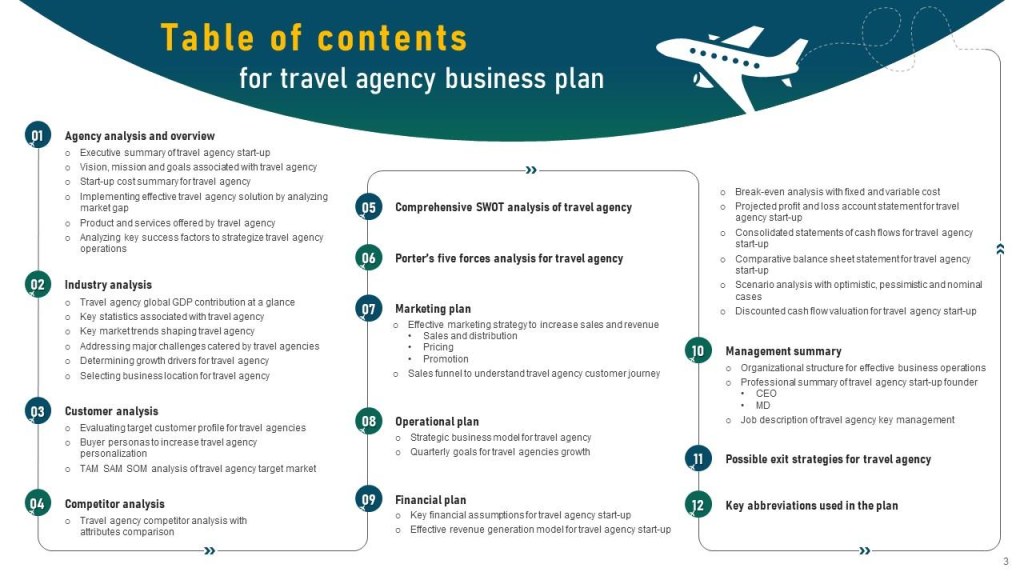Ultimate Tour And Travel Business Plan: Your Path To Success Starts Here!
Tour and Travel Business Plan: A Comprehensive Guide for Travel Enthusiasts
Welcome, Travel Enthusiast! If you’ve ever dreamed of starting your own tour and travel business, you’ve come to the right place. In this article, we will provide you with a comprehensive guide on how to create a successful tour and travel business plan. Whether you’re a seasoned traveler or a passionate wanderer, this article will equip you with the knowledge and tools to turn your love for travel into a thriving business. So let’s embark on this exciting journey together!
Introduction
When it comes to starting a tour and travel business, having a well-crafted business plan is crucial. It serves as a roadmap that outlines your goals, strategies, and financial projections. A solid business plan not only helps you stay organized and focused but also increases your chances of securing funding and attracting potential customers. In this section, we will delve into the key components of a tour and travel business plan.
1 Picture Gallery: Ultimate Tour And Travel Business Plan: Your Path To Success Starts Here!

1. Executive Summary
The executive summary is the first section of your business plan and provides an overview of your company. It should capture the attention of potential investors and give them a clear understanding of your business model, target market, and competitive advantage. In this section, you should highlight your unique selling proposition and showcase why your tour and travel business stands out from the rest.
2. Company Description
Next, you need to provide a detailed description of your tour and travel company. This includes information about your company’s background, mission statement, and legal structure. You should also mention the types of tours or travel services you offer, such as adventure tours, cultural tours, or luxury travel experiences. Additionally, it’s essential to outline your target market and explain how your business will meet their needs and desires.
3. Market Analysis

Image Source: slideteam.net
In this section, you need to conduct a thorough market analysis to identify your target audience and assess the demand for your services. Research your competitors and analyze their strengths and weaknesses. Determine your unique selling points and develop strategies to differentiate yourself in the market. By understanding your target market and competition, you can tailor your offerings to meet the specific needs and preferences of your customers.
4. Organization and Management
Here, you should provide an overview of your company’s organizational structure and management team. Outline the key roles and responsibilities of each team member and highlight their relevant experience and qualifications. Additionally, you should include information about any strategic partnerships or alliances that will contribute to the success of your business.
5. Marketing and Sales Strategy
A robust marketing and sales strategy is essential for attracting customers and generating revenue. Describe your marketing tactics, such as social media campaigns, content marketing, and partnerships with influencers. Outline your pricing strategy and explain how you will promote your tours or travel services to your target audience. Remember to include a budget for marketing and sales activities.
6. Financial Projections
Financial projections are a vital part of your tour and travel business plan as they demonstrate the potential profitability of your venture. Include a detailed forecast of your revenue, expenses, and cash flow for the next three to five years. This will help you assess the feasibility of your business and provide investors with a clear understanding of the expected return on their investment.
7. Funding Request
If you require funding to start or expand your tour and travel business, this section is where you make your case. Specify the amount of funding you need and explain how it will be used to achieve your business objectives. Provide a solid business case and demonstrate the potential return on investment to attract potential lenders or investors.
What is a Tour and Travel Business Plan? 📝
A tour and travel business plan is a comprehensive document that outlines the goals, strategies, and financial projections of a tour and travel company. It serves as a roadmap for the business, guiding its operations and growth. A well-crafted business plan is essential for attracting investors, securing funding, and ensuring the long-term success of the business.
Why is a Tour and Travel Business Plan Important? ❓
A tour and travel business plan is essential for several reasons:
1. Provides a roadmap: A business plan serves as a roadmap that outlines the steps and strategies required to achieve the company’s goals. It helps keep the business focused and organized, ensuring that all efforts are aligned towards the same objectives.
2. Attracts investors: A well-written business plan showcases the company’s potential and profitability, making it more appealing to investors. It provides a clear overview of the business model, market analysis, and financial projections, increasing the chances of securing funding.
3. Guides decision-making: A business plan helps owners and managers make informed decisions by providing a comprehensive understanding of the business and its market. It provides the necessary information to assess the viability of new opportunities and make strategic choices.
4. Sets financial goals: Financial projections included in the business plan help set realistic financial goals and track the company’s performance over time. It enables the business to monitor its financial health, identify areas for improvement, and make necessary adjustments.
5. Facilitates communication: A well-structured business plan can be shared with employees, stakeholders, and partners to ensure everyone is aligned and working towards the same objectives. It serves as a communication tool, providing a clear overview of the company’s vision, strategies, and goals.
Advantages and Disadvantages of Starting a Tour and Travel Business
Starting a tour and travel business can be an exciting and rewarding venture. However, like any business, it comes with its own set of advantages and disadvantages. Let’s take a closer look at both sides:
Advantages of Starting a Tour and Travel Business ✅
1. Fulfilling your passion: If you’re passionate about travel, starting a tour and travel business allows you to turn your passion into a profitable venture. You get to explore new destinations and share your love for travel with others.
2. Flexibility and freedom: Running your own tour and travel business gives you the flexibility to set your own schedule and work on your own terms. You have the freedom to choose the destinations, itineraries, and services that align with your vision and values.
3. Meeting new people: As a tour operator, you have the opportunity to meet people from different cultures and backgrounds. You get to connect with like-minded individuals who share your love for travel and create meaningful connections along the way.
4. Profit potential: The tour and travel industry can be highly profitable, especially if you offer unique and high-quality experiences. With the right marketing strategies and exceptional customer service, you can attract a steady stream of customers and generate substantial revenue.
5. Personal and professional growth: Starting a tour and travel business allows for personal and professional growth. You’ll develop valuable skills such as leadership, communication, and problem-solving. Additionally, you’ll gain a deeper understanding of different cultures, customs, and traditions.
Disadvantages of Starting a Tour and Travel Business ❌
1. Seasonal demand: The tour and travel industry is often subject to seasonal fluctuations. Depending on your location and target market, you may experience periods of high demand followed by slower seasons. It’s essential to plan and budget accordingly to sustain your business during lean periods.
2. High competition: The tour and travel industry can be highly competitive, with many established players and new entrants vying for customers’ attention. To stand out, you’ll need to offer unique experiences, excellent customer service, and innovative marketing strategies.
3. Operational challenges: Running a tour and travel business involves numerous operational challenges, such as managing logistics, coordinating with suppliers, and ensuring the safety and satisfaction of your customers. It requires meticulous planning, organization, and attention to detail.
4. Seasonal staff fluctuations: Depending on your business’s size and seasonal demand, you may need to hire additional staff during peak seasons. Managing seasonal staff can be challenging, as you’ll need to train them quickly and ensure they deliver the same level of service as your regular employees.
5. External factors: The tour and travel industry is susceptible to external factors such as natural disasters, political instability, and economic downturns. These factors can significantly impact travel patterns and customer demand. It’s essential to have contingency plans and diversify your offerings to mitigate potential risks.
Frequently Asked Questions (FAQs)
1. Do I need prior experience in the tour and travel industry to start my own business?
No, prior experience in the tour and travel industry is not mandatory. However, having a deep understanding of the industry, destinations, and customer preferences will greatly benefit your business. Consider gaining experience through internships, working for established tour operators, or traveling extensively.
2. What are some effective marketing strategies for promoting my tour and travel business?
Some effective marketing strategies for promoting your tour and travel business include:
– Establishing a strong online presence through a user-friendly website and active social media presence.
– Collaborating with influencers and travel bloggers to showcase your services.
– Offering discounts or special promotions to attract new customers.
– Partnering with local businesses, such as hotels or restaurants, to cross-promote each other.
– Encouraging satisfied customers to leave positive reviews and testimonials on popular travel platforms.
3. How can I differentiate my tour and travel business from competitors?
To differentiate your tour and travel business from competitors, consider the following strategies:
– Offer unique experiences or themed tours that cater to specific interests or niches.
– Provide exceptional customer service and personalized attention to each customer.
– Focus on sustainable and responsible travel practices to attract environmentally conscious travelers.
– Collaborate with local communities and support social initiatives to create a positive impact.
– Stay up to date with the latest travel trends and incorporate them into your offerings.
4. What are the essential legal considerations when starting a tour and travel business?
When starting a tour and travel business, some essential legal considerations include:
– Registering your business and obtaining the necessary licenses and permits.
– Obtaining liability insurance to protect your business and customers in the event of accidents or injuries.
– Complying with local regulations and laws related to tour operations and travel services.
– Ensuring the safety and security of your customers by adhering to industry standards and best practices.
5. How can I ensure customer satisfaction and loyalty in my tour and travel business?
To ensure customer satisfaction and loyalty in your tour and travel business, consider implementing the following strategies:
– Provide clear and detailed information about your tours, itineraries, and services to manage customer expectations.
– Offer exceptional customer service by promptly addressing customer inquiries and concerns.
– Personalize the customer experience by understanding their preferences and tailoring your offerings accordingly.
– Encourage repeat business and referrals by offering loyalty programs, discounts, or exclusive perks for returning customers.
– Continuously seek feedback from customers and use it to improve your services and customer experience.
Conclusion
Congratulations, Travel Enthusiast! You have now gained a comprehensive understanding of how to create an effective tour and travel business plan. Remember, the key to success in this industry lies in careful planning, thorough market analysis, and exceptional customer service. By leveraging your passion for travel and implementing the strategies outlined in this article, you can turn your tour and travel business into a thriving enterprise. So pack your bags, embark on this exciting journey, and make your mark in the world of travel!
Disclaimer: The information provided in this article is for educational purposes only and does not constitute professional advice. It is recommended to consult with legal and financial professionals before starting a tour and travel business.
This post topic: Tours


